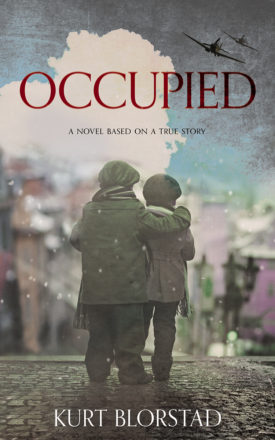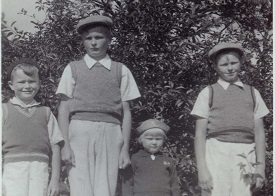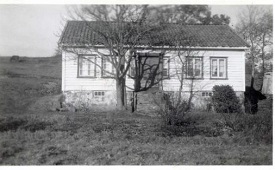 Synopsis:
Synopsis:
In 1999, author Kurt Blorstad traveled with his father, Trygve, to Norway to celebrate Trygve’s 70th birthday. As they visited landmarks from Trygve’s childhood, Trygve revealed secrets he had kept hidden for many years.
In 1936, at age seven, Trygve and his brothers, Thoralf, age eight, and three-year-old Odd, go with their mother, Pauline, to live with their maternal grandmother in a small town outside Vanse, Norway. The family had been forced to return to Norway from Brooklyn, New York, during the Great Depression. However, a year earlier, their father, Olaf, returned to America to prepare things for his family to join him. Not long after they arrive at their grandmother’s house, their sister, Thelma, is born.
Life with their grandmother is peaceful and routine. The boys help with household chores, work on their uncle Tarald’s farm, and attend the school in town. On Trygve’s tenth birthday, he catches the attention of Mr. Ellenes who hires him to work after school in his bakery. One afternoon, Trygve’s teacher, Mr. Dungvold, comes to the bakery with news of the Nazi invasion of Poland which sparks worry that the Nazis will set their sights on Norway. In 1940, Mr. Dungvold’s fears become reality, even as Olaf has amassed enough money to bring reunite the family in America.
Life in Norway under German occupation is dramatically different. The boys are required to obtain new identification papers, curfews are imposed, resources are scarce, and a Polish prison camp is established nearby. Leaving Norway is now an impossibility.
As World War II drags on, Trygve learns that through seemingly small contributions, good people can help ensure victory.
Review:

Occupied is a novel in which author Kurt Blorstad recounts the true story of his family’s survival in Nazi-occupied Norway during World War II. Although Norway declared its neutrality, Germany invaded in 1940 and maintained control of the country until the Allies’ victory in 1945.
The first part of Occupied depicts the simple existence Trygve and his family enjoyed in Norway. Although their father had returned to the United States to earn enough money to reunite the family, they were content. Relocating from their paternal grandparents’ home to their maternal grandmothers’ house required adjusting to smaller quarters and a home lacking electricity or plumbing. They had to work hard gathering and storing peat, used as fuel. Still, they were happy to welcome a new sister and hopeful that their father would send for them before too long.
However, Trygve recounts how life is forever changed on April 9, 1940. “Suddenly the sky was filled with hundreds and hundreds of airplanes! Big ones, small ones, all flying in formation, and all with Nazi swastikas on them. . . . Time seemed to stop as the planes flew over, and we all stood motionless in disbelief. This lasted for several minutes, and then all of a sudden, what was happening began to sink in.” Within a few short days, the little town of Vanse is “overrun by Nazis” who monitor the movements and behavior of the residents, search homes and businesses, and take whatever they want.

Before long, Trygve’s job at the bakery expands to include the role of lookout. Pretending to sweep the porch or perform other chores, he stands watch as local business owners meet inside to discuss developments and strategize.
Trygve takes another job at the local nursery. One day he watches helplessly as a coworker, Tore, is dragged out by two Gestapo officers. His hands bound with rope, the officers beat him on the back with batons because he isn’t moving fast enough. One of the officers announces Tore is a spy who observed the airport and docks, and will stand trial. “All I could think about was Tore and how the Nazis were probably going to shoot him captured by the Germans for spying.” Trygve witnesses first hand the increasing brutality of the Nazis as they are losing the war in Europe, killing anyone suspecting of spying or helping the resistance. Mr. Jakobsen reveals that he is a member of the XU, the Unknown Underground and Tore was working for him, watching the Norwegian coastline and reporting his observations. Now 15 years old, Trygve readily agrees to take Tore’s place since his grandmother’s home, situated at the top of the hill with an expansive view of the coast and airport, provides a perfect spot from which to observe the Germans’ activities. He accepts the spyglass Mr. Ellenes gives him without hesitation despite Mr. Ellenes’ warning: “This is not something to take lightly. You know what they are doing to him, and they would not hesitate to do the same to you should they find out.”
That moment is a turning point. Although he has seen first-hand the types of atrocities the Nazi willingly inflict, he knows it is “now my turn to help, and I want[] to start right away.”

Occupied’s first-person narration by Trygve is powerful and highly effective because of its straight-forward, earnest, and unembellished delivery. He recounts the events from 1936 through 1945 in a vivid manner with great attention to the details of time and place that pull the reader into his world. Whether describing a race with his older brother, Thoralf, on skis from their home into town, a fishing trip with their uncle Tarald, or the boundless devotion to his post as a lookout in front of the bakery on a freezing cold night that could have cost him his life, Trygve does not count himself a hero. Nonetheless, he does describe a couple of harrowing close calls, recalling that he and his brothers agreed to keep the information from their mother in order to spare her from worry.
When the war ends in 1945 with Germany’s surrender, Trygve, then 16 years old, and seventeen-year-old Thoralf must quickly join their father in America. Because he is an American citizen, Thoralf is required to return to the United States before his eighteenth birthday in order to avoid the impact of new immigration laws that require Pauline, Odd, and Thelma, Norwegian citizens, to apply for visas which will not be issued for two years. Eventually, those visas are issued and the family is happily reunited in America. Trygve recalls his mother repeating, “It’s all so beautiful,” and understanding that she was relieved not just to have her family all together, but thank that they were all safe at last.
Looking back from his perspective as a 70-year-old, Trygve appreciates the dangerous nature of his war efforts. He kept his activities a secret in large part because he agreed to help the resistance out of anger about what happened to his friend, Tore. Just a teenage boy caught in unimaginable circumstances, he “made a decision to help, without thinking about what it might mean for the rest of the family if I were caught.” Once committed, he honored his promise to help, but regret fueled his cautiousness. It most likely also saved his life, as well as his family members’ lives.
Obsessed is an absorbing, sometimes terrifying, look at a time in history when the extraordinary actions of ordinary citizens helped secure the Allies’ triumph and restore peace.



Comments are closed.